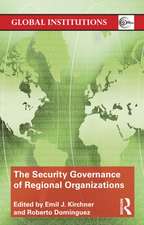The European Union as an Actor in Security Sector Reform: Current Practices and Challenges of Implementation
Editat de Oya Dursun-Ozkancaen Limba Engleză Paperback – 14 oct 2024
The volume encompasses all relevant cases of SSR in terms of the financial, human, and political resources involved at the EU level. Cases are drawn from the Balkans (Kosovo; Bosnia-Herzegovina), Africa (Democratic Republic of Congo), the Middle East (Palestinian Territories), Post-Soviet Space (Georgia), and Asia (Aceh, Indonesia). The end product is a welcome contribution to the literature, providing both an empirically and theoretically grounded approach to the study of SSR.
This book was originally published as a special issue of European Security.
| Toate formatele și edițiile | Preț | Express |
|---|---|---|
| Paperback (1) | 257.90 lei 6-8 săpt. | |
| Taylor & Francis – 14 oct 2024 | 257.90 lei 6-8 săpt. | |
| Hardback (1) | 497.76 lei 6-8 săpt. | |
| Taylor & Francis – 9 sep 2013 | 497.76 lei 6-8 săpt. |
Preț: 257.90 lei
Preț vechi: 310.33 lei
-17% Nou
Puncte Express: 387
Preț estimativ în valută:
49.37€ • 50.78$ • 40.96£
49.37€ • 50.78$ • 40.96£
Carte tipărită la comandă
Livrare economică 19 februarie-05 martie
Preluare comenzi: 021 569.72.76
Specificații
ISBN-13: 9781032928258
ISBN-10: 1032928255
Pagini: 188
Dimensiuni: 174 x 246 mm
Greutate: 0.35 kg
Ediția:1
Editura: Taylor & Francis
Colecția Routledge
Locul publicării:Oxford, United Kingdom
ISBN-10: 1032928255
Pagini: 188
Dimensiuni: 174 x 246 mm
Greutate: 0.35 kg
Ediția:1
Editura: Taylor & Francis
Colecția Routledge
Locul publicării:Oxford, United Kingdom
Public țintă
Academic and PostgraduateCuprins
Foreword Clare Short 1. The European Union and Security Sector Reform: current practices and challenges of implementation Oya Dursun-Ozkanca and Antoine Vandemoortele 2. Between knowledge and power: epistemic communities and the emergence of security sector reform in the EU security architecture Giovanni Faleg 3. From speeches to actions: EU involvement in the war in afghanistan through the EUPOL Afghanistan Mission Maxime H.A. Larivé 4. Adaptation, resistance and a (Re)turn to functionalism: the case of the Bosnian police restructuring process (2003-2008) Antoine Vandemoortele 5. The implementation of the EU security sector reform policies in the Democratic Republic of Congo? Arnout Justaert 6. Security sector reform in Kosovo: the complex division of labor between the EU and other multilateral institutions in building Kosovo’s police force Oya Dursun-Ozkanca and Katy Crossley-Frolick 7. The European Union’s role in the Palestinian Territories: state-building through Security Sector Reform? Dimitris Bouris 8. Security Sector Reform and Georgia: the European Union’s challenge in the Southern Caucasus Greg Simons 9. Which and whose authority? EU support to security governance in Aceh Simone Tholens
Notă biografică
Oya Dursun-Ozkanca (Ph.D., University of Texas at Austin, USA) is an Associate Professor of Political Science at Elizabethtown College, PA, USA. She serves as a Visiting Fellow at Research on South Eastern Europe at London School of Economics, UK. Her research interests include transatlantic security, Security Sector Reform, peacebuilding, and Turkish foreign policy.
Descriere
This book analyzes the European Union’s role in Security Sector Reform (SSR), offering a range of perspectives on the financial, human, and political resources involved at the EU level, as well as providing a theoretically grounded approach to the EU as an actor in SSR.
This book was originally published as a special issue of Eur
This book was originally published as a special issue of Eur














